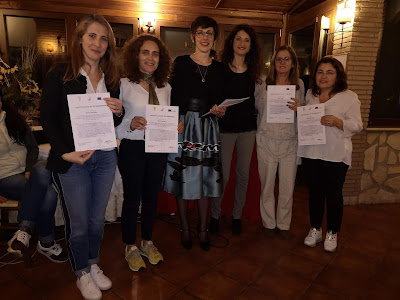The teachers involved
in the Erasmus + i.d.e.a.
-Together We Can 3rd Short-Term Join Staff Training and Learning Event of the project state their comments upon
this extraordinary meeting.
We have experienced moments of great sharing and concrete knowledge,
either by the presentation of the legal educational policies that support
inclusion in the Italian school system, or by witnessing the dynamics established in the classrooms and the involvement of the educational community in the school
projects. It was possible to share, reflect
and learn during the various interventions, presentations and work
moments that were
held during the week.
Of the various experiences, the Portuguese team highlights the session
"Meeting the emotions - The inclusive education in Italy and the
psychological variables in the good practices" by Maria Teodolinda Saturno, university professor in Rome and specialist in inclusive
education of deaf and learning
disabled children ; the visit to the Institute and Rome State School for Deaf, the detailed
explanation of their inclusion practices and pedagogical innovation in the area
- an inclusive school that
"invites" regular students
to study with deaf
students; the great
involvement of an entire educational community, in a common and unique
project to build a school open to all and for all. Moreover, an opportunity to know practices of inclusion in higher education, as mentioned by the
Rector of the University of Rome 3 present in this session.
The rural
periphery, where the
School Grouping of Montorio Romano
is situated, the
relative distance between each
of the four schools, did not prevent
the visibility of a common
project intended to give the same opportunities to all pupils.
But in Italy, as in our country, everything has been built and adapted,
for many years and
policies, to the needs and reality of the 21st century. Compared
with our inclusive educational system, it was possible to find similarities both
in legislative and in the daily practices of intervention in the classroom.
Italian schools have
all students in the class,
betting on inclusion, even for specific
disability cases. It was
possible to observe,
on a visit to the Public School
for Deaf in Rome, an example
where it was necessary to work through
the reforms for
true inclusion. Being
a deaf school, mixed classes have been created with hearing and deaf
students where everyone communicates with sign language and the learning is developed in very similar
ways!
Once again,
it was rewarding to observe good
examples of inclusiveness in schools and job
related areas.
All in all,
the meeting was:
well organized; with a well-structured Program; clearly showed
the schools’ dynamics; particularized the presentation of documents that
support the identification of specific
educational intervention situations; provided the exchange
of questions and clarification of doubts; although filling in the docs did
not seem very
adequate due to the scarcity of given information; great diversity of activities throughout the day – also
opportunity to extend
knowledge on local
cultural, historical and geographical issues;
there were specific work choices,
very focused on the theme
under development; workshop
such as the one of the emotions provided concrete opportunities for
action and learning; workshops in classes, with different age levels, created
opportunities for greater
interaction among all and
the visibility of daily activities; visit to professional inclusive
schools; example of the transformation of a school / institute, initially created to give a specific but segregating
response; great involvement of the Educational Community: very positive
initiative - the presentation of a musical in a public
space in the
city of Nerola,
with the presence
of teachers, assistants, parents
in the audience and project
partners.
Finally,
the Portuguese team wishes to highlight the professionalism, sympathy and
restlessness of the Italian staff: their ability to smile and spread gaiety and
warmth!!
Thank you Italy!!











Thank you very much, Portugal! It's nice to hear you could witness and understand the life project of a SEN student according to the Italian and our school's point of view.
ReplyDelete